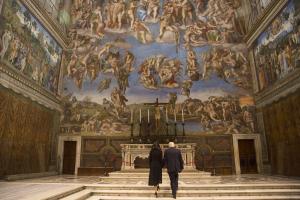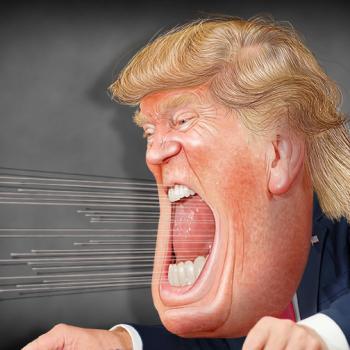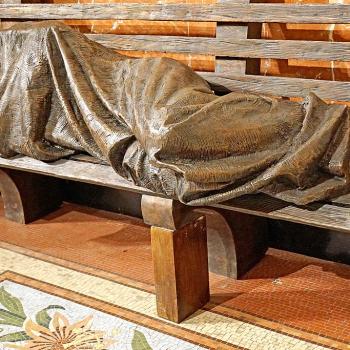These are the things that you shall do: Speak the truth to one another, render in your gates judgments that are true and make for peace, do not devise evil in your hearts against one another, and love no false oath, for all these things I hate, says the LORD” (Zech. 8:16-17 RSV).

COVID19 has not gone away. The first attempt to put it in check failed because the President of the United States, and many of his followers, did not have the willpower to deal with the problem. They wanted instantaneous success without inconvenience on their parts. They still do not want to be inconvenienced: so long as they do not think they will suffer the consequences of the virus, they are willing to sacrifice multitudes with their indifference. Their policies, their ideologies, are all selfish; they do not look for or care about their neighbor, they only care about themselves and their own wants and desires. They would sacrifice everyone for a COVID19 party today. They were not willing to accept a lockdown, and now they are not willing to put on a mask. [1]
Protestors said COVID19 was fake. They said it was as bad as the seasonal flu. It isn’t. it’s much worse. In a few months, there have already been over a hundred and forty one thousand deaths due to COVID19, and nearly four million people are known to have been infected by it. And, unlike the flu, many of those who survive it are not in the clear, and it is not evident that they will ever fully heal from the virus. We do not even know if the virus is like chickenpox, capable of having a secondary outbreak in the future, and if it is, what that secondary infection would be like. But we don’t have to know about that to know the damage it does to the body is so bad that the military will not enlist COVID19 survivors.
What, then, does Trump do in the middle of the pandemic? Does he encourage the people to work together, to come together in solidarity, so that they can come out of the pandemic together? No. It seems as if he is using it as an opportunity to continue to dismantle the United States, to encourage strife, so that when the election comes, he can use that strife to his own advantage.
Trump says he wants businesses to thrive, but then he threatens the destruction of the Postal System, which, if he gets what he wants, will destroy those businesses which rely upon the mail to survive. Many use it to buy and sell goods, such as medicine, while others use it advertise, and many still use it to pay bills or receive money from others. Imagine the kind of chaos and the lives which will be harmed or lost if all that abruptly comes to an end. We must save the Postal System if we want the United States to thrive.
Trump wants to force schools to open, despite the coronavirus, despite knowing that the pandemic will be getting much worse before it gets better. If schools do not open up as he wishes, he threatens to cut their funding. Despite what some have suggested, children can get the virus, and they can die from it. They will also become carriers, capable of killing those who come in contact with them, including their teachers, parents and grandparents.
And, finally, Trump selfishly wants to take the United States out of the rest of the world, to make it live and die for itself. He is doing all that he can do to get a vaccine for COVID19 for the United States alone, so that he would deny such a vaccine to others.
Selfishness helped the pandemic spread. To survive, we will have to reject such selfishness, and realize the world is in this together. We must work together. We must share what we know, and act according to prudence based upon what we know. We have to be concerned about others, for only when we are concerned for each other will we truly find the will which we need to be victorious against the virus. The world is interdependent, and it is such interdependence which gave strength to the virus, but it is also such interdependence which can give us strength in combatting it. We need to work together in solidarity. We are not independent, which is exactly one of the many lessons we should learn from the pandemic, as the Pontifical Academy for Life explained in its newest document, Humana Communitatis in the Age of Pandemic: Untimely Meditations on Life’s Rebirth:
With the pandemic, our claims to autonomous self-determination and control have come to a sobering halt, a moment of crisis that elicits deeper discernment. It had to happen, sooner or later, for the bewitchment had lasted long enough.[2]
How we have treated the earth in our selfishness has created the means by which COVID19, and other potential viruses, to cause havoc around the world:
Consider the chain of connections that link the following phenomena: increasing deforestation pushes wild animals in the proximity of human habitat. Viruses hosted by animals, then, are passed on to humans, thus exacerbating the reality of zoonosis, a phenomenon well known to scientists as a vehicle of many diseases. The exaggerated demand for meat in first world countries gives rise to enormous industrial complexes of animal farming and exploitation. It is easy to see how these interactions might ultimately occasion the spread of a virus through international transportation, mass mobility of people, business travelling, tourism, etc. [3]
And so, unlike the direction Trump wants to lead the United States, the solution is not “every man, woman and child” for themselves, or “every country for themselves,” but rather, the realization that what affects us will affect the other, and what affects the other will affect us. Rejecting this reality has been a part of the problem and why COVID19 has also been able to spread so quickly:
The same lack of interconnectedness can be observed in efforts to develop remedies and vaccines. Absence of coordination and cooperation is now increasingly recognized as an obstacle to address Covid-19.The awareness that we are in this disaster together, and that we can only overcome it through cooperative efforts of the human community as a whole, is stimulating shared endeavors. [4]
The virus should not be used by some as a way to get rich, to exploit the need for a cure. Once a vaccine is developed, no one should corner the market on its use, but rather, it should be used by and for all:
The first concerns universal access to the best preventive, diagnostic, and treatment opportunities, beyond their restriction to a few. The distribution of a vaccine, once available in the future, is a point in case. The only acceptable goal, consistent with a just allocation of the vaccine, is access for all without exceptions. [5]
Those with the best knowledge and resources, such as the World Health Organization, should be given a special place in the search for a cure and its proper execution:
Solidarity extends also to any efforts in international cooperation. In this context, a privileged place belongs to the World Health Organization (WHO).Deeply rooted in its mission to lead international health work is the notion that only the commitment of governments in a global synergy can protect, foster, and make effective a universal right to the highest attainable standard of health. This crisis emphasizes how much is needed an international organization with a global outreach, including specifically the needs and concerns of less developed countries coping with an unprecedented catastrophe. [6]
And finally, as we learn more about COVID19, our response will change; that should not surprise us. We are dealing with a pandemic in live time. We will make mistake, especially early on, because of how little we know about the virus. But what is clear is that in all we do, we must remember our ethical obligations, and we must follow through with them as we seek to deal with the pandemic. If society is unwilling to do so without the force of legal obligations, then regulations should be put in place and enforced, but even then, we should strive to educate people so they will be willing to do what is right if for no other reason than it will be what is best for them in the long run:
The adoption of specific rules by a community requires attentiveness to the evolution of the situation on the field, a task that can be carried out only through a discernment grounded in ethical sensibility, not just in obedience to the letter of the law. A responsible community is one in which burdens of caution and reciprocal support are shared proactively with an eye to the well-being of all. Legal solutions to conflicts in the assignment of culpability and blame for wilful misconduct or negligence are sometimes necessary as a tool for justice. However, they cannot substitute trust as the substance of human interaction. [7]
Thus, we must care about the truth. We must speak the truth about COVID. We must act according to that truth, making judgment calls which promote the common good. We must not use the virus as an opportunity for some selfish gain at the expense of others; rather, we must see it as a call to solidarity, to make sure we stop devising evil thoughts against one another and instead begin to work for the betterment of all. Not only is this the best way to get through the crisis, it is the only way to make sure we do not suffer a similar, or worse, crisis in the future. The Trump administration, and the United States, threatens the welfare of the world so long as it does not follow through with those obligations we all have for the good of the world. The Pontifical Academy for Life highlights what needs to be done if we want to thrive , and what it suggests, runs contrary to the selfishness represented by the Trump administration. We still have time to change this. Those within the United States must put pressure on Trump, on the states within the union, and on all those selfishly ignoring the existential threat which lies before us today, to make sure that they finally realize that whatever minor inconveniences we must do now will lessen the inconvenience of the future.
[1] It is true, there might be a few people with medical reasons which would prevent them from wearing a mask. They are to be treated the same way people who cannot take various vaccines are treated: this is the reason why everyone else needs to do their part to keep them safe. That they can be exceptions to the rule does not mean the rule is wrong, but that the rule, as with all rules, needs to be engaged with prudence, not legalism. Using them as an excuse to ignore the general need for masks will only work to harm them as well.
[2] Pontifical Academy for Life. Humana Communitatis in the Age of Pandemic: Untimely Meditations On Life’s Rebirth. Vatican translation. 2 [1.2].
[3] Pontifical Academy for Life. Humana Communitatis in the Age of Pandemic: Untimely Meditations On Life’s Rebirth, 2-3 [1.2].
[4] Pontifical Academy for Life. Humana Communitatis in the Age of Pandemic: Untimely Meditations On Life’s Rebirth, 4 [1.3].
[5] Pontifical Academy for Life. Humana Communitatis in the Age of Pandemic: Untimely Meditations On Life’s Rebirth, 6 [2.2].
[6] Pontifical Academy for Life. Humana Communitatis in the Age of Pandemic: Untimely Meditations On Life’s Rebirth, 6 [2.2].
[7] Pontifical Academy for Life. Humana Communitatis in the Age of Pandemic: Untimely Meditations On Life’s Rebirth, 8 [2.3].
Stay in touch! Like A Little Bit of Nothing on Facebook.
If you liked what you read, please consider sharing it with your friends and family!













